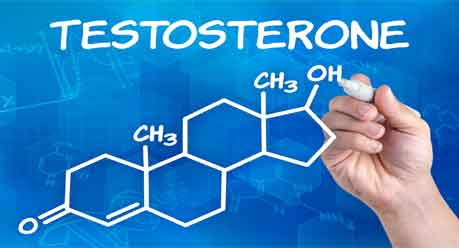Prostate cancer is the second largest killer and the most common cancer of males. Declining testosterone levels increase the ratio of estrogen to testosterone in aging males and prostate cancer risk increases accordingly. It is projected that all males following this pattern will ultimately die of prostate cancer, if they don’t succumb to another disease first.
Prostate is a Male Organ that Develops in Response to Testosterone

The prostate wraps around the male urethra and contributes fluid to semen. Development of the prostate is dependent on the male hormone testosterone and prostate cells have testosterone receptors. Testosterone stimulates prostate cancer growth and anti-testosterone therapies are the mainstay for prostate cancer chemotherapy.
Humans Produce Both Testosterone and Estrogen
Males and females produce both testosterone and estrogen. In both cases cholesterol is converted into testosterone-like molecules that are subsequently converted into the estrogens. Males have a higher testosterone to estrogen and in females, the ratio is reversed with a preponderance of estrogen. During the female menstrual cycle the ratio changes. Males (XY chromosomes) with defective receptors for testosterone have exaggerated, super-female appearance, because their tissues only respond to the estrogens that they produce.
Prostate Cells Have Estrogen Receptors
Estrogen receptors are the target for breast cancer therapy, e.g. tamoxifen, because of the obvious connection between breast development and estrogen production. Similarly, testosterone antagonist drugs were developed for the treatment of prostate cancer. Searches for estrogen receptors in the prostate were initially negative, because the only known estrogen receptor at the time was not present in the prostate. The identification of a second estrogen receptor, ER-beta, resulted in tests of estrogen antagonists on prostate cancer cells.
Prostate Cancer Is Inhibited by Anti-Estrogen Drugs

An anti-estrogen, ICI 182,780, was found to inhibit the growth of prostate cells. In further experiments, the mechanism of inhibition was examined to determine how estrogen stimulates prostate cancer growth, Home page. These studies revealed that the estrogen receptor, ER-beta, does not act directly to control expression of particular genes, but rather, it acts through interactions with the major inflammation transcription factor, NFkappaB. These recent studies suggest that therapies combining inhibition of both inflammation via NFkappaB, e.g. curcumin or thalidomide, may work in concert with appropriate estrogen receptor inhibitors for effective new therapies for currently untreatable prostate cancer. Intense research is in progress to evaluate the most effective combination of anti-testosterone, anti-estrogen and anti-inflammatory agents to attack particular forms of prostate cancer.